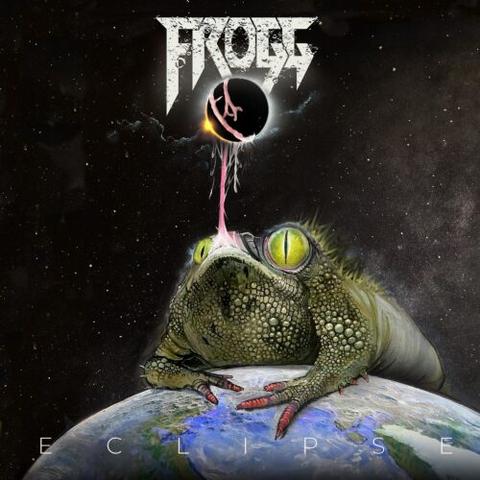By Dolphin Whisperer
It’s a bird! It’s a plane? No! It’s a Frogg! Hailing from the festering urban sprawl of New York City, the upstart amphibian clan skews modern in influence and modernER in attack. Pulling the rip to progressive twist of Between the Buried and Me with the focus of tight structures and virtuosic play, Eclipse as a debut full-length, spins scales and riffs in only the way that a driven tech death band can. In this day and age, of course, tech alone can’t make the only splash. But something’s in the water where Frogg dwells, something laced with all the fidgeting whirr and tongue-out gambol for which a thirsting prog fan could ask.
In sweeping flair and uptempo character, Eclipse displays a corona of youthful exuberance around its core of high-practice death metal. Death metal via aggressive, riff-based drives and scratchy, barked vocals anyway—Frogg does not play the straight and skanky vomitous mosh tunes of olde. Rather, the swamp that Frogg inhabits spews a funk that curls senses around the Cynic-enabled rumblings of Augury or the ever-flowing melody of prime Neuraxis. And though the sounds of heavy chord chugs (“Life Zero”) and tricky-picked sweeps (“Interspecific Hybrid Species”) exist along that thought pattern, in bursts of individuality Frogg tears in equal abandon from ethereal jazz fusion (“Walpurgisnacht”) and metalcore-coded guitar fury (“Double Vision Roll”). Ambient long enough to let its gasping audience realign for another round of progressive tumbling, Eclipse barrels from jumping jack percussive runs to full layout fretboard gymnastics to chirping keys alerts all in a steady and vigorous breath.
Dense and meticulous, and through a love of screeching guitar histrionics and high-spirit guitar and synth work, the splatter of Frogg’s patchwork renders clear as a Klimt through virgin eyes. Despite the seeming excess, founding mind (and primary throat) Sky Moon Clark (The Mantle) and Brett Fairchild, while displaying their talent for hyperspeed, harmonized arpeggio runs (“Dandelion,” “Wake Up,” “Interspecific…”), maintain firm drops back into developed melodies and shrill inclusions—squabbling whammy flutters, clanging pick rakes, harmonic pings—to attach madness to memory. Wearing a strong relative compression,1 layers upon layers of these dancing guitar melodies stack atop pummeling kick runs and sputters, and lockstep counterpoint bass runs,2 to construct a shifting, shuffling mass of amplified chatter that never loses momentum. And with breaks both into hand-percussion and piano-led dance moments (“Walpurgisnacht,” “Wake Up,” “Sun Stealer”), full-blown mosh bridges (“Life Zero,” “Omni Trigger”), and guitar hero antics, keeping the feet and neck and fingers still throughout Eclipse is no easy task.
Though the tech lineage waves proudly in every Frogg leap, an attachment to human touches in production keeps Eclipse from feeling like another sterile outing in the crowded genre. It caught me by surprise the first time I heard “Dandelion,” Its introductory tap-sweep bustling with a clacking dryness that exposed its slight imperfections while creating an allure of reckless speed and challenge. Many look to technical expressions of metal to be effortless, but this particular patina about Frogg’s escalating scale runs, which swirls through screaming, bent peaks and note-stuffed solo explosions, transforms the feeling of étude into an extemporaneous romp. In this playful platform, Pat Metheny-imbued guitar whimsy can crash against glitching djentisms to gentle resolve (“Interspecific…”) or even force an end-of-range guitar squeak to take center stage after an exercise of finger envy (“Sun Stealer”). Boisterous might be the default loudness setting for this kind of saturated work, but in Frogg’s and seasoned engineer Jamie King‘s hands, Eclipse finds wrinkles along its dialed lines.
Yet, Eclipse isn’t perfect. Its extreme dedication to complex construction will pose an issue to the unprepared—digesting this kind of technicality-positioned music is never effortless. The volume of riffage, the speed of every rollicking bar, the force of every abundant fill present loaded and crooked in smile, though the shorter-form execution lowers the threshold for repeated exposure. In a rose-colored vision of what progressive death metal can be, Frogg finds a freedom in fanciful melody, brief poppy breaks, and unrestrained (but not all encompassing) musical showmanship. And if a debut can unwrap as fresh as Eclipse does, Frogg may very well find the world entrapped in their sticky wiles.
Rating: 3.5/5.0
DR: 9 | Format Reviewed: 320 kbps mp3
Label: Self Release
Websites: froggofficial.bandcamp.com | facebook.com/froggband | tiktok.com/@froggband3
Releases Worldwide: March 7th, 2025
#2025 #35 #AmericanMetal #Augury #BetweenTheBuriedAndMe #Cynic #Eclipse #Frogg #IndependentRelease #Mar25 #Neuraxis #PatMetheny #ProgressiveDeathMetal #ProgressiveMetal #ProgressiveMetalcore #Review #Reviews #SelfRelease #TechnicalDeathMetal

